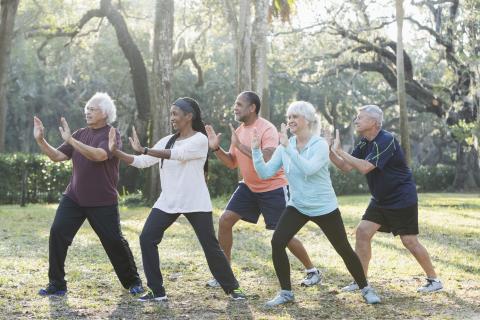Tai Chi Lowers the Risk of Falls … And That’s Just the Beginning
The Journal of the American Geriatrics Society recently confirmed that tai chi can be an excellent exercise to lower seniors’ risk of falling. Researchers from the University of Jaén in Spain examined the data from a number of studies, and reported: “There was high-quality evidence that tai chi significantly reduced the rate of falls by 43 percent compared with other interventions at short-term follow-up (less than 12 months) and by 13 percent at long-term follow-up (more than 12 months). Regarding injurious falls, there was some evidence that tai chi reduced risk by 50 percent over the short term and by 28 percent over the long term.”
This is great news. Tai chi, which the study authors describe as “an ancient Chinese practice focused on flexibility and whole body coordination that promotes harmonized motion in space,” is already being used as a balance training practice in senior centers, gyms and senior living communities around the world.
Falls are a serious problem for older adults, often leading to serious injury, loss of independence, and even death. So it’s great to know that tai chi lowers the risk!
And that’s not all. While you’re lowering your fall risk and improving your balance, you could also be improving your health and mood in 10 other ways:
- Tai chi has been shown to fight late-life depression and anxiety disorders, providing all-around mood support for older adults.
- Tai chi is a safe, gentle exercise for people with arthritis. It can reduce pain and improve joint function.
- Tai chi can help stroke survivors relearn how to maintain their balance, both while standing and moving. It may even reduce the risk of another stroke by lowering blood pressure.
- Tai chi can be a good exercise for people who are living with congestive heart failure, chronic obstructive pulmonary disease (COPD) and other cardiovascular and respiratory conditions.
- Tai chi has been found to improve balance and stability for people who have Parkinson’s disease.
- Despite its gentle nature, tai chi has been found to increase muscle strength.
- Some studies show tai chi boosts the immune system by lowering stress.
- People with lower back problems can lower their perception of pain and improve flexibility with tai chi.
- Tai chi can improve the quality of sleep.
- Some studies even suggest that tai chi could benefit us on the genetic level!
Before you begin any exercise program, including tai chi, ask your doctor. You may want to have the doctor recommend a particular program for someone with your health conditions. The National Institute of Aging says to choose an instructor who is trained in working with people for whom certain postures or movements would not be advised, such as those with joint pain, hernia or the effect of injuries.
You can find a tai chi class through your local senior center, recreation department or senior living community. Tai chi is often practiced in groups, but some people enjoy doing it alone, perhaps in a park or other outdoor place when the weather is nice.
